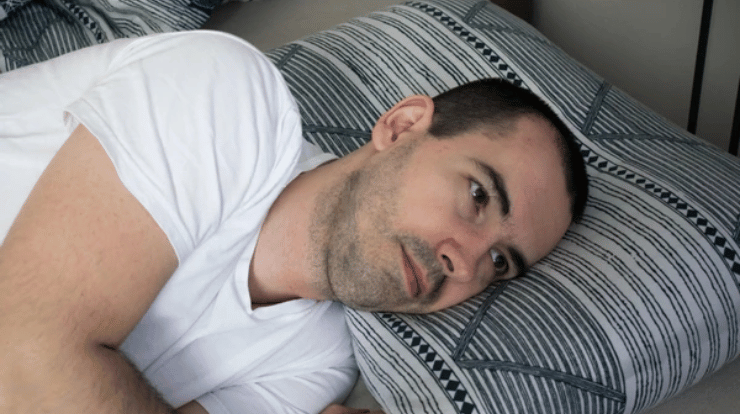
Falling asleep fast can be a challenge for many people, especially those who have trouble winding down at night or who suffer from insomnia. However, there are several strategies and techniques that can help you fall asleep faster and get a better night’s rest.
How to Fall Asleep Fast in 10 Seconds?
The “4-7-8” breathing technique, also known as “relaxing breath,” is a simple but effective way to fall asleep in as little as 10 seconds. This technique is based on the idea that controlling your breath can help to relax your mind and body, making it easier to fall asleep. Here’s how to do it:
- Sit or lie down in a comfortable position, with your back straight and your shoulders relaxed.
- Close your eyes and breathe in silently through your nose to a mental count of four.
- Hold your breath for a count of seven.
- Exhale completely through your mouth to a count of eight.
- Repeat this process several times until you feel relaxed and ready to sleep.
It’s important to note that it might take some time to get used to this technique, and it’s also important to keep in mind that the goal is not to fall asleep but to relax. Additionally, you can try to keep your mind focused on breathing and nothing else.
It’s also important to have a comfortable sleep environment, such as a dark and quiet room with a comfortable mattress and pillows, and to avoid screens for at least 30 minutes before bedtime. Establishing a regular sleep schedule, avoiding caffeine and heavy meals close to bedtime, and practicing relaxation techniques like yoga or meditation can also help improve your sleep.
Top 20 Tips on How to Fall Asleep Fast
Following are the 20 expert tips on how to fall asleep when you can’t:
1. Stick to a consistent sleep schedule by going to bed and waking up at the same time every day. This helps regulate your body’s internal clock and makes it easier to fall asleep at night.
2. Create a comfortable sleep environment by keeping your room dark, quiet, and cool. Darkness signals to your body that it’s time to sleep, while noise and heat can be disruptive. Aim for a room temperature between 60-67°F (15-19°C)
3. Use comfortable bedding and pillows to ensure a good night’s sleep (Buy a pillow for sleeping). Invest in a comfortable mattress, pillows, and bedding that will provide the right amount of support and comfort for your body.
4. Avoid screens (TV, phone, tablet, etc.) for at least 30 minutes before bedtime. The blue light emitted from screens can suppress melatonin production and make it harder to fall asleep.
5. Establish a relaxing bedtime routine, such as reading or listening to soothing music. Having a routine can signal to your body that it’s time to wind down and prepare for sleep.
6. Practice relaxation techniques, such as yoga, meditation, or progressive muscle relaxation. These techniques can help reduce stress and tension in the body, making it easier to fall asleep.
7. Avoid caffeine, nicotine, and alcohol close to bedtime. These substances can disrupt the natural sleep process and make it harder to fall asleep.
8. Limit heavy meals close to bedtime. Eating a heavy meal close to bedtime can cause discomfort and indigestion, making it harder to fall asleep.
9. Try a warm bath or shower before bed to help relax your muscles. The warm water can help to soothe sore muscles and promote relaxation.
10. Use earplugs or a white noise machine to block out any disruptive sounds (Buy earplugs). Background noise can make it harder to fall asleep and stay asleep.
11. Avoid napping during the day, as it can make it harder to fall asleep at night. Napping during the day can disrupt your body’s natural sleep patterns and make it harder to fall asleep at night.
12. Try using a weighted blanket to help relax your body (Buy a weighted blanket). The weight of the blanket can provide a sense of security and comfort, making it easier to fall asleep.
13. Use a humidifier to add moisture to the air, which can help to soothe dry and irritated nasal passages.
14. Try aromatherapy with essential oils like lavender, chamomile, or valerian root. These oils have soothing properties that can promote relaxation and sleep.
15. Try the “4-7-8” breathing technique to help relax your mind and body. This technique involves taking slow, deep breaths in and out through the nose to help promote relaxation and sleep.
16. Keep your bedroom clutter-free to promote a sense of calm. A cluttered and disorganized bedroom can create feelings of stress and anxiety, making it harder to fall asleep.
17. Avoid stimulating activities before bed, such as playing video games or working on a computer. Stimulating activities can make it harder to relax and fall asleep.
18. Try using a natural sleep aid, such as melatonin or valerian root (Buy melatonin). These supplements can help regulate the body’s sleep patterns and promote sleep.
19. Use a fan or open a window to create a gentle breeze, which can help to cool your body and promote sleep.
20. Seek medical advice if you have trouble sleeping regularly. Insomnia or other sleep disorders may be a sign of an underlying health condition and can be treated with appropriate medical advice.

How to Fall Asleep Fast For Kids?
Here are some tips to help children fall asleep fast:
- Establish a consistent bedtime routine. A bedtime routine can signal to your child that it’s time to wind down and get ready for sleep.
- Make the bedroom environment comfortable and conducive to sleep. Keep the room cool, dark, and quiet, with comfortable bedding and pillows.
- Limit screen time before bedtime. The blue light emitted from screens can suppress melatonin production and make it harder for children to fall asleep.
- Encourage relaxation techniques. Teach your child deep breathing exercises, progressive muscle relaxation, or guided imagery to help them relax before bedtime.
- Keep a regular sleep schedule. Children thrive on routine and a consistent schedule can help regulate their internal clock, making it easier for them to fall asleep.
- Avoid stimulating activities before bedtime. Encourage your child to do something calming such as reading a book or listening to soothing music before bed.
- Make sure your child gets enough physical activity during the day. Regular exercise can help improve sleep quality and make it easier for children to fall asleep.
- Create a comfortable sleeping environment. Make sure the bedding and pillows are comfortable and the room is at the right temperature, around 60-67°F (15-19°C)
- The use of a nightlight can help some children who are afraid of the dark.
- Encourage your child to talk about any worries or concerns they may have so that they can feel heard and understood before sleep.
- Try an age-appropriate natural sleep aid, such as Melatonin.
- Encourage your child to keep a sleep diary to record their sleep patterns and identify any potential sleep disruptors.
- Seek medical advice if your child has trouble falling asleep regularly.
It’s important to note that every child is different and what works for one may not work for another, so it may take some trial and error to find the best sleep routine for your child.






